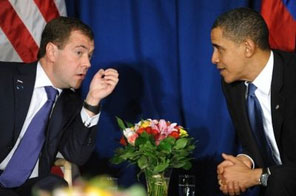Russia-US nuclear treaty ready soon: Kremlin
MOSCOW: US President Barack Obama and his Russian counterpart Dmitry Medvedev have agreed that Washington and Moscow are close to reaching agreement on a new nuclear disarmament treaty, the Kremlin said.
US and Russian negotiators have been meeting in Geneva to discuss a successor to the 1991 Strategic Arms Reduction Treaty (START), a landmark Cold War-era nuclear arms pact which expired in December.
In a telephone conversation on Saturday, both presidents "expressed satisfaction with the highly advanced state of preparations" for the new accord, the Kremlin said in a statement.
During their talks, "it was stressed that it is already possible to set firm dates to submit the draft agreement to the heads of state for their signature," it said, without giving a specific timeframe.
Medvedev and Obama "agreed to give additional instructions to the delegations" with a view to finalising a deal, it said.
In Washington, US National Security Council spokesman Mike Hammer said the two presidents had a "good" conversation in which they reviewed the progress of the Geneva negotiations.
"The results of their talks are encouraging, and both leaders are committed to concluding an agreement soon," he said.
US Secretary of State Hillary Clinton is to discuss START with her Russian counterpart Sergei Lavrov when she visits Moscow on Thursday and Friday.
Signed in 1991, START led to huge reductions in the US and Russian nuclear arsenals and imposed verification measures to build trust between the two former Cold War foes.
The broad outlines of a replacement treaty have been clear since July, when Obama and Medvedev agreed to slash the number of warheads on either side to between 1,500 and 1,675.
The United States has said it currently has some 2,200 nuclear warheads, while Russia is believed to have about 3,000.
But the talks have been complicated by disagreements over a range of issues, including US plans for a missile defence system in eastern Europe.
The New York Times reported Tuesday that Obama had been "frustrated" after a February phone call with Medvedev, who told him Moscow wanted to reopen issues that Washington had thought settled, including the missile shield.
In particular, Moscow was angered by an announcement in January that Romania would host elements of a US missile shield and sought to reintroduce the issue of missile defence at the talks, The New York Times said.
Russia's foreign ministry later denied that disagreements over the missile defence system were holding up the negotiations.
Agreeing a replacement for the treaty has been a foreign-policy priority for the Obama administration and a deal would help bolster the US leader's stated goal of a world free of nuclear weapons.
But a White House spokesman hinted this week that US negotiators would not rush the START talks just to get a new deal signed before April, when Obama hosts a nuclear non-proliferation summit in Washington.






